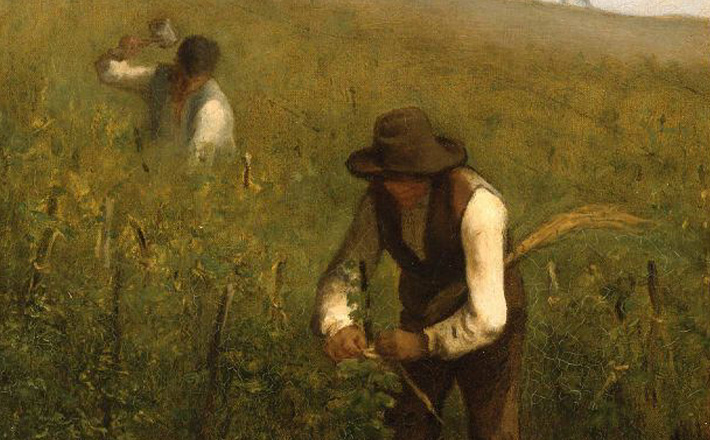Commentary on Hebrews 11:29—12:2
From the miraculous to the macabre, the faithful of Israel’s past provide the encouragement this congregation needs to keep running their own race of faith.
Endurance consistently features throughout the Epistle to the Hebrews. This author passionately desires his audience to hold fast, endure, remain strong until the end (Hebrews 2:1; 3:6, 14; 4:11, 14; 10:23). In other words, they need to continue trusting God, to remain in faith (3:7-4:11; 10:39). Hebrews 11 teaches them the nature of faith through word (11:1) and story (11:2-40). By this 29th verse, his recounting has already lifted up Abel, Enoch, Noah, Abraham and his family, and Moses. All of them trusted God even if they could not fully imagine what God’s promises would entail.
The wilderness generations
The story of Moses’ miraculous deliverances leads to God’s deliverance of the people of Israel from the Egyptians. What is rather striking is that the author attributes the act of faith to the Israelites. They, by faith, walked through the Red Sea as if they were walking on dry ground. When the Egyptians made a similar attempt, they were overwhelmed by the sea; they did not act in faith, but in vengeance. It is worth noting the faith of these Israelites because earlier in the letter, they are the same people who serve as the author’s example of anti-faith. They did not trust God to bring them into the land of Canaan, and he does not want his readers to be like them (Hebrews 3:7-4:11). By referring to their faith in the moment of deliverance from the Egyptians, the author casts into even sharper relief their lack of faith at a later time. This generation continues to serve as the negative example, and even more so because they had faith at one time. The author hopes his audience won’t follow a similar path.
Their children, however, the next generation, trusted God and were brought into the land (Numbers 14:31), but not without struggle. Grammatically, the author attributes faith to the walls of Jericho in v. 30. More fitting than to imagine the faith of an inanimate object is to see him referring to the faith of those who were walking around those walls for seven days (Joshua 6).
He closes this section by noting the faith of Rahab, the Canaanite woman who hid the spies of Israel as they were preparing to attack Jericho. Because she received them and kept them in peace, because she did not allow them to fall into the hands of their pursuers (Joshua 2), she did not perish along with those who failed to believe in the power of Israel’s God (see her proclamation of faith in Joshua 2:10-11). It is worth puzzling over the author’s choice to close his catalogue of faith with this unlikely character: a woman, a Canaanite, a prostitute. Yet she fits an overarching theme of the stories chosen in that she trusts God in the face of death and thereby receives life for herself and her family. For him, faith comprises not only mental assent, but indicates that belief upon which you stake your life, this life and the next.
And everyone else…
Time is running out, and if he wants to remain true to his assertion that this word of exhortation is brief (Hebrews 13:22), he needs to pick up the pace. Surprisingly then, the period of the judges, the kingdom, and the exile passes by with mention of only a few names. Then, in 33-35a even names are eliminated and only the deeds of faith appear. Initially, these are all very victorious, conquering, powerful. Here, too, the culmination is one of life over death — as it was with the story of Rahab — women have received their dead back through resurrection. The author might have in mind the resurrections of children during the ministry of Elijah and Elisha (1 Kings 17:17-24; 2 Kings 4:18-37) or possibly resurrections during Jesus’ ministry (John 11) or even Jesus himself.
A hard contrast follows. Others also died. These, however, suffered on their way to the end and were not revived. They still look forward to obtaining a better resurrection (11:35b). In the next verses, a litany of sufferings flows from his pen, hardships of all kinds in life and in death. Even in these situations, their faith remained.
The author concludes that all of these mentioned in Hebrews 11 are worthy of praise. They have been attested (with a passive verb he implies that God, through Scripture, commends them) throughout their faithfulness. This applies to their lives when they trusted God for various things, and also to their faithfulness that has continued beyond the pale of death. They have not yet taken possession of the promise, the promise to remain with God and his people in his city forever (Hebrews 4:1; 6:17; 9:15; 10:36; 11:16). Hence God continues to attest to their faithfulness because ultimate perfection remains ahead for them.
God looked ahead and made provision for something better, something better that concerns not just the faithful of the past, but also the faithful of the present, the author and his readers. The forebears in faith cannot reach that place of perfection without the present generation of the faithful. One of Abraham’s promises involved a multitude of descendants. Until everyone joins the party (Hebrews 12:22), until everyone resides in the household (Hebrews 3:6), the promise remains unobtained.
Run, faithful, run
And so, the baton passes to them. The author paints a scene of the close of a race. As runners enter the stadium, they are surrounded by the crowd all around. The “cloud of witnesses” both proclaims the story of their own faith, and expectantly waits for those running to endure in theirs. Get rid of anything that would trip you up, the author commands. With the cloud around you, keep your eyes before you on the ultimate runner — the one who created the race of faith and the only one who has reached its perfect end. Jesus endured an excruciating death and did not let the shame of his reproach squelch the joy that kept him going. This was the same joyful promise to which all God’s children look forward: residing with God and his people forever. Jesus is there now, at God’s right hand, and through his prayers (Hebrews 7:25) he not only cheers the church militant but sustains them along the way.


August 14, 2016